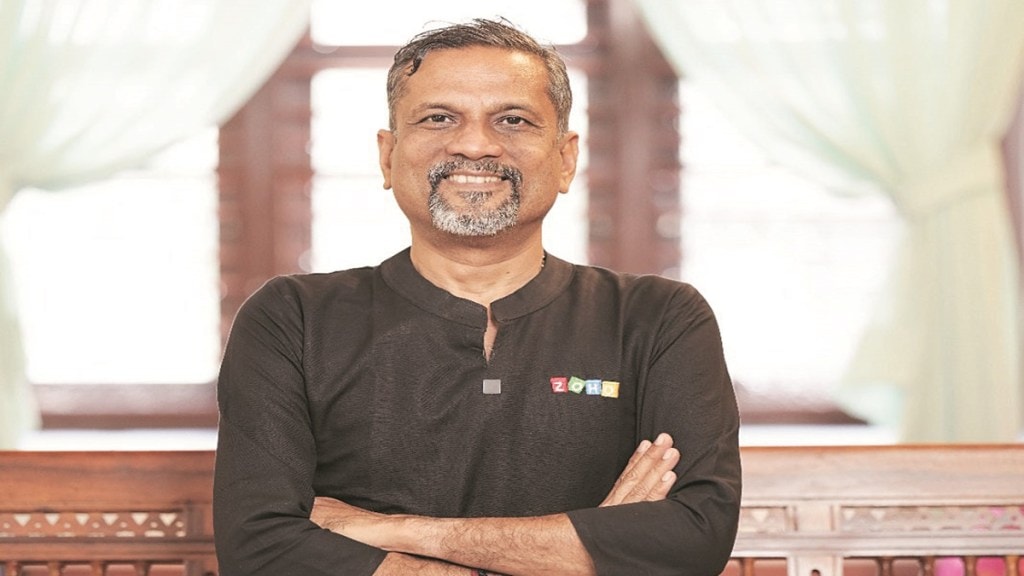Sridhar Vembu is someone who believes in taking the road less travelled. At a time when America and Europe are the largest markets for the majority of India’s IT services biggies, the co-founder & CEO of Chennai-based business software maker Zoho has zoomed in on India with a razor-sharp focus. He has rolled out an aggressive business expansion strategy that includes investing in R&D and people, opening new offices and learning centres, and powering overall community development. In the last six months, the company has opened two ‘hub’ offices in Tiruppur and Trichy; and plans to open more in Tirunelveli and Madurai districts of Tamil Nadu as well as one in Uttar Pradesh, down the line.
“For long, the US and Europe have been the preferred markets for Indian IT services firms. As much as we are technologists and have a robust SaaS portfolio, it remains that business growth is not ceiling-less, especially given the current economic backdrop and the speed at which technologies like AI evolve,” said Vembu. “This is why it’s important to focus on the basics and stay grounded while also innovating and reinventing continuously to serve our customers better. We are confident that should global economic conditions worsen, our model of long-term investment in people and R&D here will become relevant. We will sustain this course.”
Also read: Practo lays off 41 workers
Destination India
According to Vembu, India is the hottest market today. “In three years, India will become the No.2 market for us and in seven to 10 years, it could replace the US as the No.1 market,” he told FE. In recent years, Zoho has made inroads into several new markets, such as the Middle East, Latin America, Africa, and Mexico. The diversification in terms of product portfolio, geographic coverage of revenue and regions, has cushioned the company from the ongoing global crisis, he said.
The key to Zoho’s success is in seeing value in the overlooked, according to Vembu. “Small, often rural communities, hold immense talent, but lack viable employment options; we want to change that. We have shifted from the “mega-office” model and are now opening smaller offices. If we can bring high-tech jobs to places where there are none, we can help stimulate local economic revitalisation,” he said.
New business model
In 2020, Zoho decided to follow a hub-and-spoke model of offices to cater to a distributed workforce, and as part of its ‘transnational localism’ strategy of being locally rooted, while staying globally connected. The hub offices are ones that can accommodate 1,000 or more employees, while the spoke offices are smaller offices with up to 100 employees. Eventually, each hub office will have a few spoke offices associated with it for infrastructure support and team collaboration.
The company currently has five hub offices, including ones in Chennai, Tenkasi, and Renigunta, and around 30 spoke offices all across India. Nearly 2,000 employees are working out of Zoho’s hub-and- spoke offices in villages and Tier 2/3 towns, out of which about 1,000 employees were hired locally. “The distributed workforce model reflects the idea of distributing growth and income across tier II/III communities instead of urban concentration. Many of our product development teams today sit out of these hubs and spoke offices, including some teams that are involved in deep-tech R&D. The long-term vision of these efforts is to create self-sufficient and economically prosperous rural communities,” said Vembu.
Zoho has a track record of recognising opportunities and having the first-mover advantage. In the past 25 years, it has brought more than 55 products to the market, employs 12,000-plus people and has over 80 million users globally. But as much as Zoho loves to build next-gen software, it sees its people and company culture as its most important assets. Its rural initiatives to nurture grassroots innovation and drive community progress are bold and laudable, but whether they can effect material change remains to be seen.
Also read: Family businesses must desist from legal battles, says Parekh
STAYING ON COURSE
* Zoho sees India as the hottest market, set to become No. 2 in three years
* India could even replace US as the top market in 7-10 years
* Ongoing rural efforts aimed at investing in R&D and people
* Hub offices have 1000+ employees while spokes cater to up to 100 employees
* Many of its product teams sit out of these hub-and-spoke offices

